What Does a Plaintiff Have to Prove? (Part One)
Slip and fall and trip and fall accidents can cause serious injuries, like fractures or head injuries. Slip and falls are very common in the workplace, such as construction sites or loading docks. In busy cities like Philadelphia, such fall down accidents are very common. Common businesses and establishments which may be liable in a slip and fall lawsuit include:
- apartments/dorms,
- bars/restaurants,
- hospitals,
- schools,
- institutions,
- businesses such as shopping malls or retail stores,
- grocery stores,
- hotels,
- and more.
In general, under Pennsylvania law, a person who is injured on another person’s property must prove the following:
- the owner owed them a duty,
- the owner breached that duty, by committing some act of negligence,
- the act of negligence caused the accident, and
- damages.
The majority of fall down accident cases involving slip and falls or trip and falls boil down to whether the plaintiff can prove 1. that the property owner owed a duty or 2. whether the owner was negligent. For the second part of this article series, click here to read more about how to prove a property owner was negligent in a Philadelphia slip and fall or trip and fall accident.
Philadelphia, Pennsylvania Slip and Fall/Trip and Fall Law-What is an Invitee, Licensee or Trespasser?
Under Pennsylvania law, the duty a property owner owes to a person on their land depends on whether the person is an invitee, licensee or trespasser.
An invitee is considered someone who is on the property by invitation of the owner. For example, a grocery store customer is an invitee of the grocery store. Tenants of residential properties like apartment complexes are considered invitees when in common areas, like hallways, garages, parking lots, stairwells, etc. Property owners are required to conduct reasonable inspections of their property for invitees and will be liable if they either knew or should have known of the defective condition.
A licensee is someone who is on the property with permission, rather than invitation of the owner. For example, a pedestrian walking on a sidewalk in front of a storefront is a licensee, or a gas company employee who is on the property to obtain a gas reading is a licensee. Property owners will be liable for injuries to a licensee if they know of a defective condition and fail to warn of the defect.
A trespasser is someone who has no permission to be on the property. For example, a person who is climbing a retaining wall on a property without permission to be on the property is a trespasser. Property owners must refrain from willfully injuring trespassers. There is one major exception under Pennsylvania law: children who are known to come onto a property, even without the owner’s permission, are basically elevated to status of a licensee.
To submit your case for review by our Philadelphia, Pennsylvania slip and fall lawyers, call (215) 399-9255. Our slip and fall lawyers are available for a free, no obligation legal consultation.
**This website does not provide legal advice. Every case is unique and it is crucial to get a qualified, expert legal opinion prior to making any decisions about your case. See the full disclaimer at the bottom of this page.
Our slip and fall accident attorneys serve accident victims in the following areas: Allegheny County, PA; Berks County, PA; Bucks County, PA; Chester County, PA; Delaware County, PA; Lehigh County, PA; Montgomery County, PA; Northampton County, PA: Philadelphia County, PA; Atlantic County, NJ; Burlington County, NJ; Camden County, NJ; Cumberland County, NJ; Gloucester County, NJ; Salem County, NJ; New Castle County, DE; he County, DE; Atlantic City, NJ; Philadelphia, PA; Pittsburgh, PA; Newark, NJ; Doylestown, PA; Media, PA; West Chester, PA; Norristown, PA; Camden, NJ; Wilmington, DE; Newark, DE; Georgetown, DE; and New Castle, DE.

